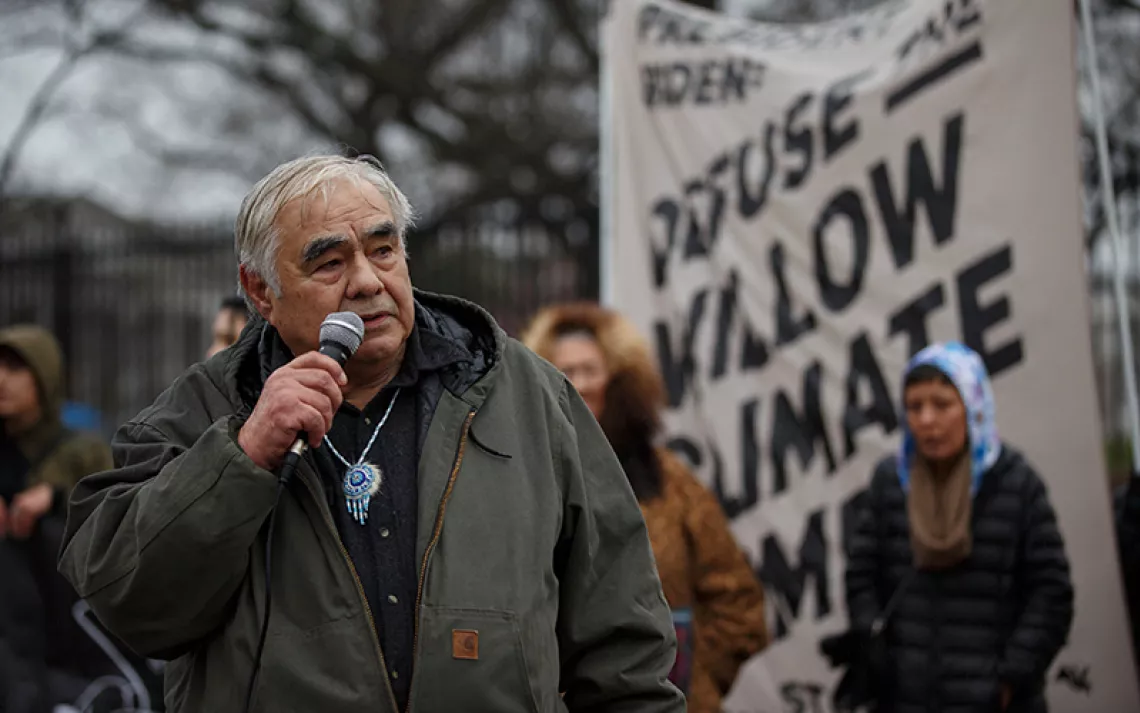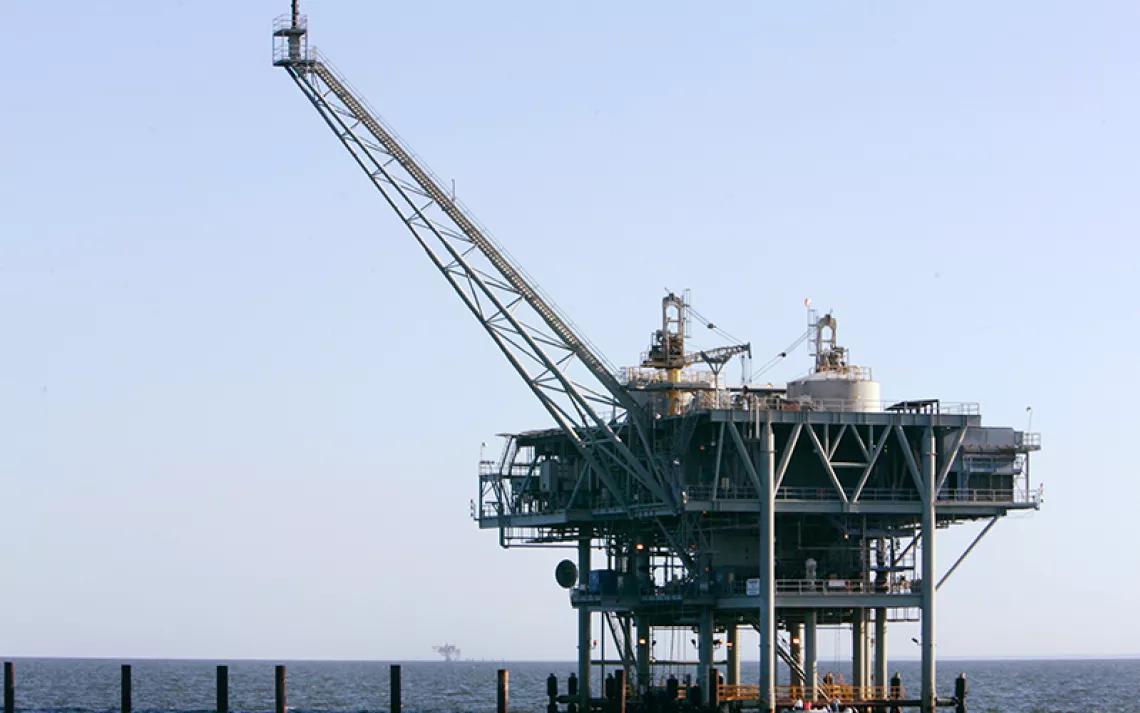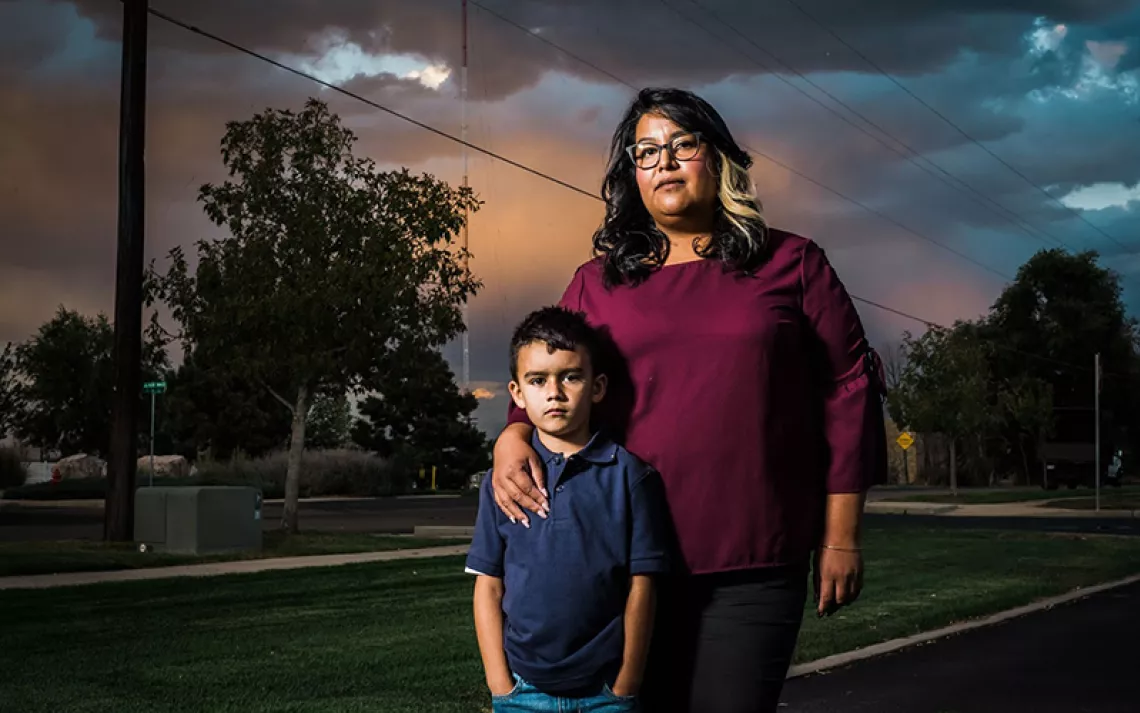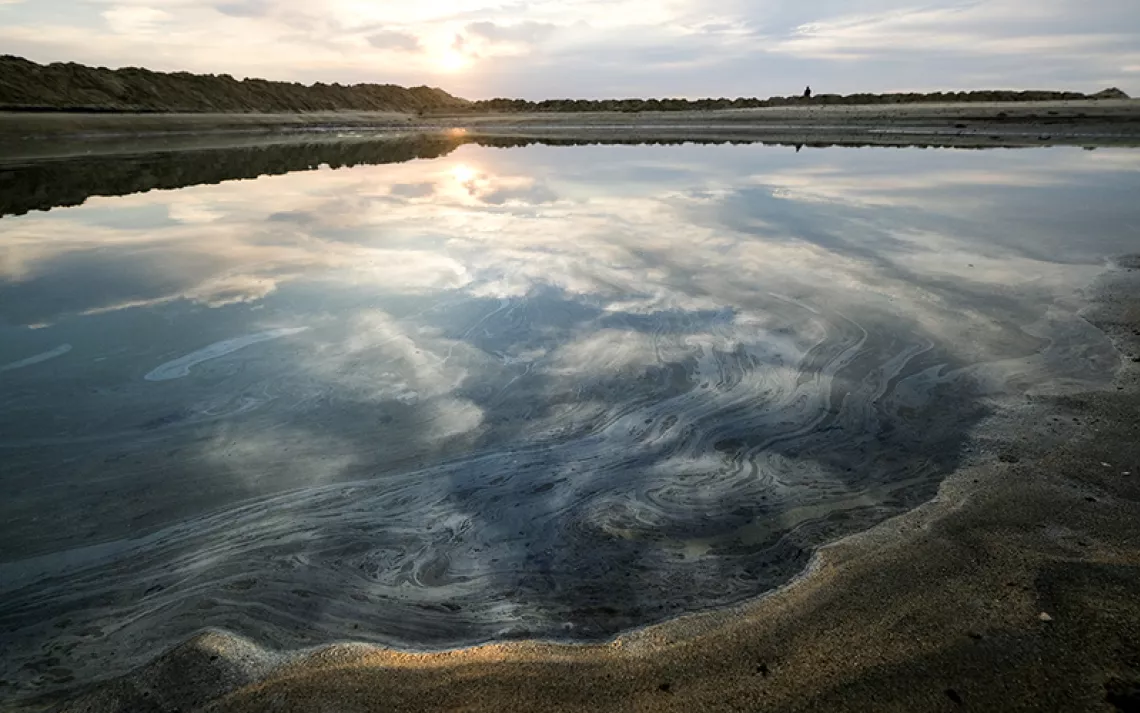The Southern Revolt Against Offshore Oil Drilling
In South Carolina, opposition to Trump's drilling plan is a bipartisan affair
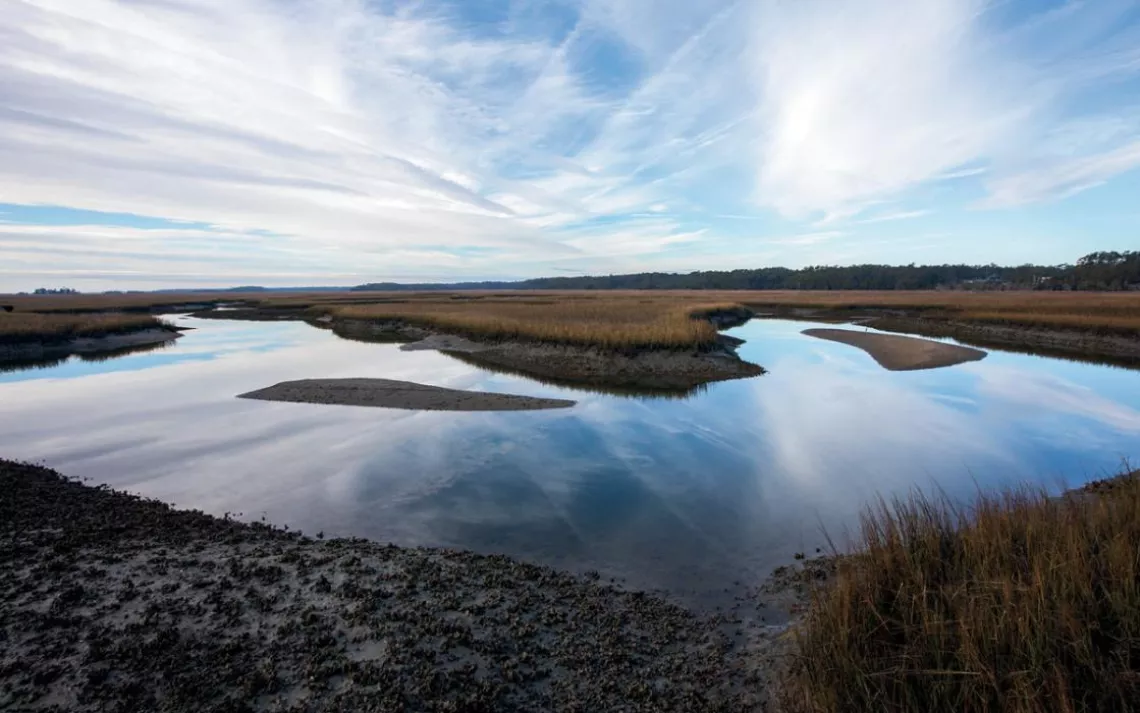
About 90 percent of commercially harvested marine species in South Carolina spend time in estuaries like this one, the North Inlet–Winyah Bay National Estuarine Research Reserve. | Photos by Peter Frank Edwards
CAPTAIN MARK COLLINS SPOTTED a dorsal fin in the distance, leaned into the wheel of his 42-foot cruiser, and bounced us over rough autumn waves, heading for what his internal radar told him could be a whole lot of dolphins.
Two leaped from the water like synchronized swimmers, and suddenly our group of tourists and local families was surrounded by sleek, black, arcing fins. Collins, a burly figure in T-shirt, jeans, and baseball cap, lowered an underwater microphone to capture the dolphins' chatter. "I've heard them sound like a donkey braying," he said, "or sometimes they're dead silent." We held on to the rail, hoping for a message, and sure enough, the air soon filled, via an onboard speaker, with chirps and squeals from below the ocean's surface.
With his wife, Amy, Collins has built a career out of his love for dolphins. The couple took thousands of people on dolphin-watching excursions last year from Crazy Sister Marina in Murrells Inlet, South Carolina, about 80 miles northeast of Charleston. Though Collins can talk endlessly about marine mammals, politics has inevitably nosed its way into his rap.
"Can't sugarcoat it anymore, guys. Our oceans are in trouble, which means the human race is in trouble," he said, extending a hand out toward the azure sea. Then he brought up the imminent threat of gas and oil exploration here, on one of the last remaining untouched coastlines of the United States.
Early in the trip, Collins pointed to an artificial reef about three miles from shore. If approved, round-the-clock seismic testing to search for gas and oil could happen that close to his beloved dolphin grounds. The seismic blasts—10 to 15 seconds apart—can be heard underwater up to 2,500 miles away and can destroy dolphins' auditory- and optic-nerve systems. If the dolphins disappear, the Collinses' business could, too. Regardless, the oil drilling that might eventually result would surely mar the picture-perfect coastline that stretched behind us.
Collins ticked through recent oil-related disasters—including an explosion on a tanker in the Gulf of Mexico the day before—and encouraged his passengers to write to their elected officials. This isn't a Republican or Democratic issue, he argued: The oceans belong to us all. At a moment when, for the first time in recent history, the United States is a net exporter of oil, it simply makes no sense to drill here, Collins said. "If the oil companies get their hands on this, it's gone forever."
The prospect of oil companies getting their hands on the Atlantic coast has become much more likely with the release, in early January, of an Interior Department proposal to open nearly all U.S. coastlines to oil and gas exploration and drilling. Backlash to the plan from coastal communities has been significant in both red and blue states, but especially so in Republican-dominated South Carolina, where bipartisan momentum to protect the coastline has been building for years.
The Collinses are part of an eclectic group of South Carolina coastal residents—business owners, citizens' groups, activists, and legislators—who, regardless of party affiliation, are rallying against the Trump administration's intensifying efforts to open the Atlantic up for oil and gas extraction. They worry that offshore drilling and its accompanying onshore infrastructure will wreak environmental and economic havoc, turning their largely undeveloped coastline into the East Coast version of Louisiana's Port Fourchon, home to the biggest oil terminal in North America. Together, these disparate voices form an ad hoc but politically potent coalition that could serve as a model for other coastal states grappling with how best to protect their shores during the Trump administration.
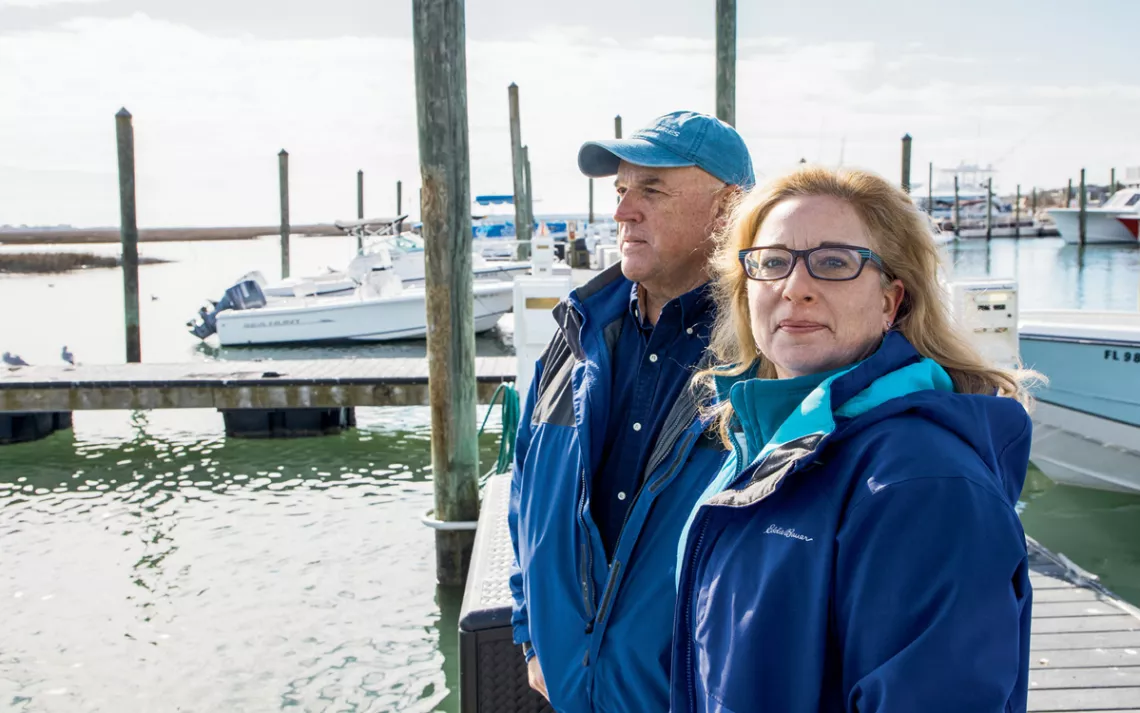
Mark and Amy Collins
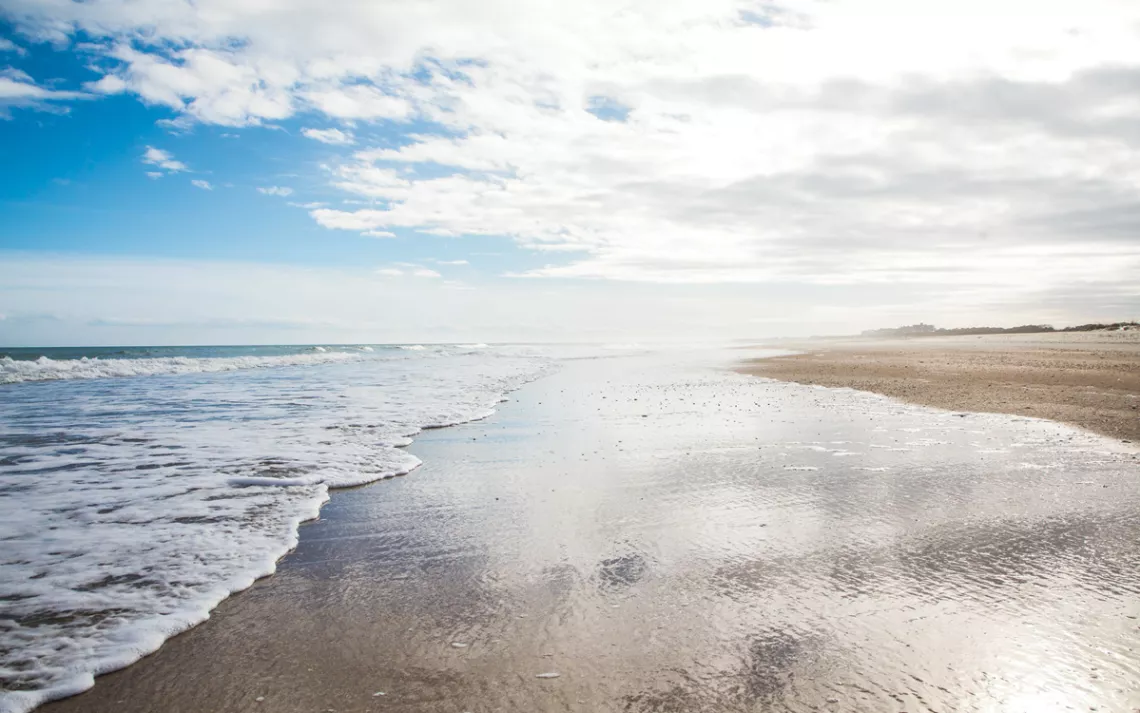
For now, the beaches of South Carolina's Pawleys Island are unblemished by the sight of offshore oil wells.
CAROLINIANS FIRST BEGAN paying close attention to the prospect of oil drilling in the Atlantic in late 2013, when then-mayor Dean Lambeth of Kure Beach, North Carolina, signed a letter to the federal government's Bureau of Ocean Energy Management (BOEM) in support of seismic testing. It turned out the letter was drafted by a lobbying group for the American Petroleum Institute. Some 300 Kure Beach citizens crowded a town hall meeting to voice their disapproval. A month later and three miles up the road, the town council of Carolina Beach passed a resolution against seismic testing. Caswell Beach and other coastal towns in North and South Carolina soon followed suit.
Opposition to drilling swelled on the East Coast in 2015, when President Barack Obama included the Atlantic in a draft five-year plan for oil and gas development. Though the proposal attracted Republican support—including from then-South Carolina governor Nikki Haley—every local government on the South Carolina coast objected. Obama removed the Atlantic from the plan in 2016 and rejected pending seismic-testing permits just before leaving office.
Then, just a few months into his presidency, Donald Trump signed an executive order directing Interior Secretary Ryan Zinke to review Obama's BOEM plan and encourage offshore energy production. A week later, Zinke ordered the fast-track review of at least five pending permits for seismic testing. In response, 150 East Coast municipalities and more than 1,200 local, state, and federal officials wrote resolutions and sent letters to the BOEM in opposition to testing and drilling; an alliance of more than 41,000 businesses and 500,000 fishing families from Maine to Florida announced its objection; and governors from North and South Carolina, Virginia, Maryland, New Jersey, and Delaware came out against drilling in the Atlantic.
But the Trump administration barreled ahead. On January 4, Secretary Zinke released a new draft five-year plan that seeks to open up more than a billion acres in the Atlantic Ocean, the Pacific Ocean, the Arctic Ocean, and the Gulf of Mexico to oil and gas leases. If realized, it will amount to the largest expansion of offshore drilling since the technology was developed.
As soon as the plan was announced, a firestorm of opposition from states on both coasts erupted. After Republican governor Rick Scott of Florida met with Zinke to discuss his concerns, Zinke said that he would exempt Florida from the plan, writing on Twitter, "I support the governor's position that Florida is unique and its coasts are heavily reliant on tourism as an economic driver." Zinke's announcement (which the acting director of the BOEM later had to disown in an appearance before Congress) drew anger and accusations of political favoritism from other coastal governors, who were quick to point out that their states also rely heavily on coastal tourism. South Carolina governor Henry McMaster, a Republican, was among the state leaders asking for an exemption like Florida's. "Every city and town council along the South Carolina coastline has voted to oppose seismic testing and drilling, and I agree with them," McMaster wrote in a mid-January letter to Zinke.
Scott and McMaster are both staunch Trump supporters, but when it comes to offshore oil drilling, they are following the lead of their coastal constituents. Members of tourism boards, restaurant and hotel associations, and chambers of commerce all fear that oil exploration and drilling will have devastating consequences for their local economies. According to a 2015 report by the international advocacy organization Oceana, nearly 1.4 million jobs and more than $95 billion in annual gross domestic product depend on a healthy ocean for fishing, tourism, and recreation on the Atlantic coast. In South Carolina alone, about 78,000 people are employed in ocean-based tourism and recreation. Another 1,000 work in fisheries, aquaculture, and seafood markets. Drilling puts such jobs at risk. Pollute clean, attractive beaches and clear ocean waters and tourists will find someplace else to spend their vacation savings and buy their fresh seafood.
A Louisiana Office of Tourism study found that tourist spending in Louisiana plummeted by $247 million after the 2010 Deepwater Horizon disaster, which contaminated almost 1,100 miles of coastal marshes and beaches. While part of the financial loss was offset by spending on oil cleanup, those aren't the kinds of jobs that municipalities want to cultivate. The effect spread into Florida when people postponed or canceled vacations, assuming that oil had sullied Florida's west coast beaches. According to a 2016 federal study, the Gulf of Mexico's seafood industry may have lost up to 9,315 jobs. Despite these devastating impacts, the Trump administration is currently seeking to roll back safety regulations put in place after the disaster.
Spills from drilling, transporting, and refining oil don't have to be catastrophic to have a negative cumulative effect. Between 2001 and 2015, the BOEM reported 725 oil spills from drilling platforms and pipelines in U.S. waters. However, oil companies may be underreporting the number and volume of spills. The Louisiana Bucket Brigade, an environmental group, analyzed U.S. Coast Guard data and concluded that the Gulf of Mexico had experienced 479 offshore drilling accidents in 2016 alone. That's an average of nine a week.
Along with its economic repercussions, Atlantic drilling could interfere with national security efforts. In a different study, Oceana assessed U.S. Department of Defense activities in the Atlantic against maps for proposed offshore drilling. It found that about 94 percent of the waters off Virginia's coast and 78 percent off Georgia's coast are incompatible with drilling because of undersea warfare training and other activities. Prior to the Trump administration, the Pentagon openly worried about the effects of drilling on its Atlantic coast operations—"from unit level training to major joint service and fleet exercises," according to one Pentagon statement.
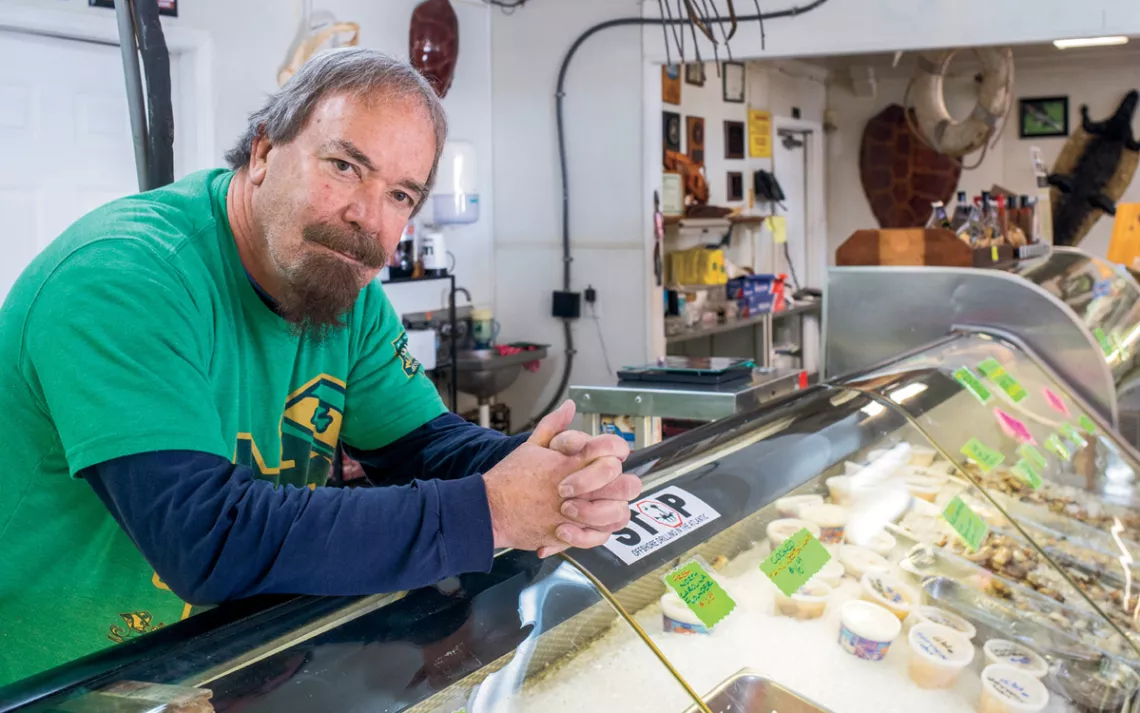
Rick Baumann
ON THE SAME DAY AS THE dolphin excursion, I stopped by Murrells Inlet Seafood, a market and catering business near Crazy Sister Marina. Rick Baumann, who started the business in the late 1980s, was steaming shrimp when I arrived. Affectionately dubbed a "certified executive redneck chef" by his colleagues, Baumann is also known for writing blunt anti-drilling columns in the South Strand News and taking part in meetings with congressional leaders and the BOEM.
A New York City native who was stationed at Myrtle Beach Air Force Base and then stayed in the region, Baumann said he votes Republican 85 percent of the time. To him, the drilling issue has nothing to do with party affiliation; it has to do with the oil industry's track record and effect on local communities.
"After decades of being involved in Big Oil, areas around Port Fourchon are still some of the most poverty-stricken in America," Baumann told me as he turned to slice a swordfish. He fears that if the oil industry moves in, South Carolina will struggle with the same problems that communities in Louisiana do: degraded water and air quality and hurricanes that trigger oil and chemical leaks.
When Hurricane Harvey pummeled Texas in August, more than 40 sites in Houston emitted millions of pounds of hazardous pollutants, the New York Times reported. One pipeline-and-petrochemical-storage company was the source of nearly half a million gallons of leaking gasoline.
South Carolina business owners like Baumann have been well organized in their opposition to offshore oil drilling. The state's small-business chamber of commerce, founded by advertising and PR executive Frank Knapp, was one of the first business organizations to come out against seismic testing and drilling. Later, Knapp formed the Business Alliance for Protecting the Atlantic Coast (BAPAC), with members along the seaboard from New Jersey to Georgia. Similar business alliances are now forming on Florida's eastern Gulf shore and the Pacific coast.
Knapp believes that the support of the business community has been a major reason why Republican politicians at both the state and the federal level have been willing to go against their own party leadership on this issue. "If the business community strongly opposed this," Knapp told me when I reached him by phone, "it was safe for a member of Congress or a leader at the state level to oppose it also."
Congressman Mark Sanford, a former South Carolina governor, has been at the forefront of Republican opposition to offshore drilling. After numerous municipalities in his coastal district passed anti-drilling resolutions, Sanford took a position against it in 2015. Other Republican politicians followed his lead. By the time the Trump administration issued its proposal for seismic-testing permits last June, more than 100 members of Congress had signed a letter—written by Florida Republican representative John Rutherford and Virginia Democratic representative Don Beyer—to Secretary Zinke expressing their strong opposition to offshore gas and oil exploration in the Atlantic.
In response to the draft plan released in January, Sanford issued a statement saying, "Whether you are for or against offshore drilling, I think we could all agree that locals should have some degree of voice on what happens in their backyard." Drilling for oil doesn't make sense, he added, when most engineers have estimated that there is no more than a four-month supply of oil reserves in the Atlantic continental shelf.
Chip Campsen III, a conservative in the South Carolina Senate, typifies Republican dissent on the issue. Both a politician and a businessman, he owns Fort Sumter Tours, which takes tourists on boat trips to where the Civil War began. For that purpose, he has commissioned ships built in the Gulf of Mexico and navigated them to South Carolina via Louisiana—which he says is an eye-opener. While he affirms that he's "very much a free-market guy, for less regulation," the tangle of onshore infrastructure in the Port Fourchon area needed to support offshore drilling alarms him. "Look at satellite imagery," he insisted when I phoned, "and you tell me where we're going to put that on South Carolina's coast."
Sure enough, a quick look on Google Earth is enough to see why he's upset. From above, Port Fourchon resembles a mass of gray brain matter. Upon closer viewing, trucks, silos, cranes, and concrete dominate the landscape. It's hard to imagine such industrial scenes adjoining South Carolina beach resorts where toddlers touch the ocean for the first time, or replacing wildlife refuges where great blue herons preen.
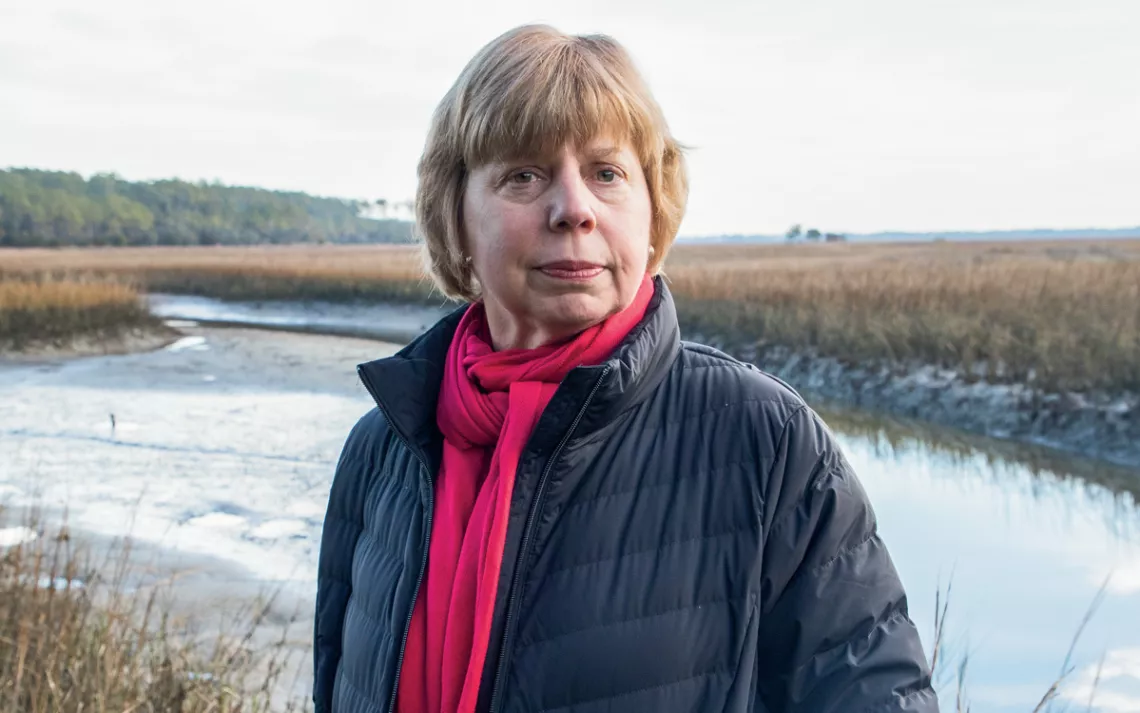
Peg Howell
ON ANOTHER LATE-FALL DAY, I traveled to the coastal town of Georgetown, where for years there has been talk of building oil infrastructure in and around the port. There I met with Peg Howell, the spokesperson for the volunteer group Stop Offshore Drilling in the Atlantic (SODA). Howell was the first woman to graduate with a BS in petroleum engineering from Marietta College and the first woman to serve as a "company man"—the industry name for the supervisor on a drilling rig—in the Gulf of Mexico. She worked for ExxonMobil, Marathon Oil, and Chevron in the United States and on the North Sea, then earned a Harvard MBA and developed a career as a management consultant.
I first saw Howell on YouTube, in a dark suit and pearls, as she testified to the House Committee on Natural Resources last summer. In her testimony, she described the effect that seismic-testing noise has on mammals' ability to communicate, navigate, feed, and mate and how it harms marine life down to zooplankton, which in turn hurts commercial fishing and restaurants. At least half the time, she cautioned, seismic testing does not reliably reveal the presence of oil and gas; if it did, "Royal Dutch Shell would not have spent $7 billion on a dry hole in the Arctic two years ago."
Seismic results are available exclusively to the BOEM and the oil companies for 25 years, not to members of Congress or private citizens, she warned. And regardless of what the testing reveals—whether the company stays or walks away—the damage to sea life has already been done.
The United States now leads the globe in both oil and gas production, Howell reminded the representatives, and what's more, President Trump has proposed selling half the nation's strategic petroleum reserve. We are exporting more than a million barrels of crude each day to India and other countries. The stampede to produce more is unwarranted, she argued.
Howell had exchanged her suit for a SODA T-shirt when I had lunch with her and her husband, a Republican on the Georgetown County Council. Afterward, we stopped by the library to visit with Marilyn Hemingway, a community activist whose family has lived in Georgetown since the slavery era.
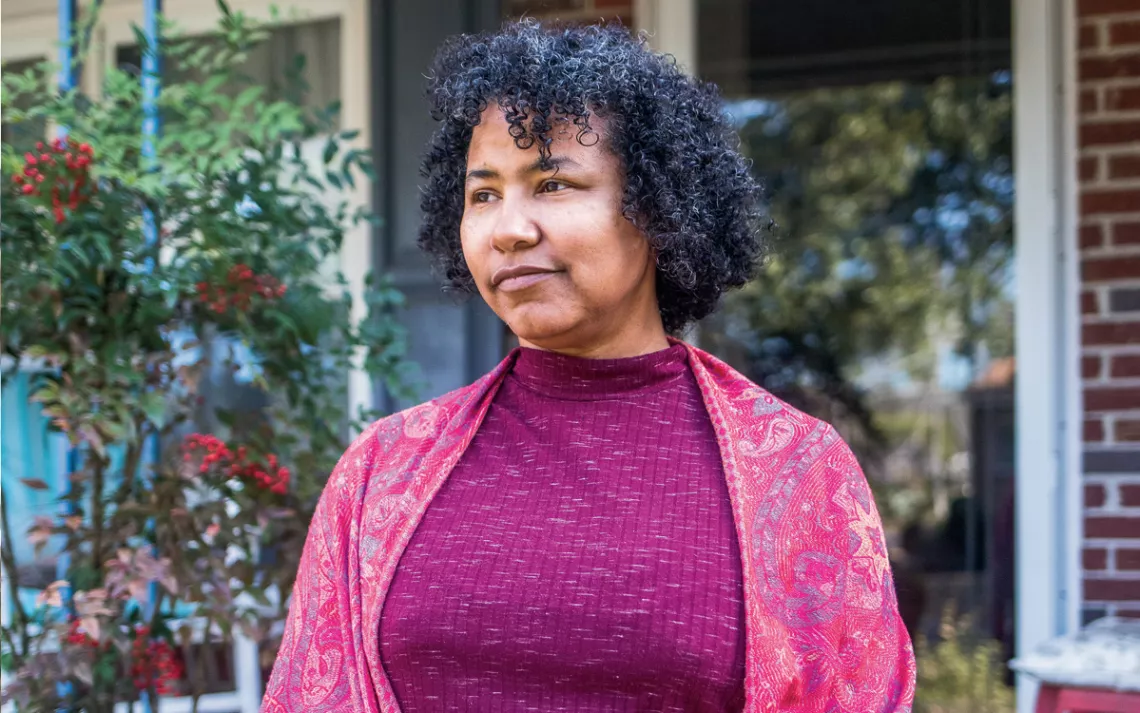
Marilyn Hemingway
In 2015, Hemingway happened to fill in for a friend at a meeting in North Charleston about coastal concerns. An oil industry representative presented a plan to bring refineries to Georgetown, flashing a map on a PowerPoint slide of the paper mill and West End, the largely African American neighborhood that abuts the port. Hemingway immediately realized that this map might someday show a petroleum refinery and a spider web of roads strangling the neighborhood. She was aghast. "There was no mention whatsoever," she said, tapping her hand on the table, "of the people who are living in the area that he was so lackadaisically pointing out" as the future home of refineries.
That plan didn't come to fruition, but state senator Stephen Goldfinch, who represents the area and is in favor of offshore oil drilling, still likes to talk up the possibility of building refineries in Georgetown. Given that persistence, and the Trump administration's energetic support for the fossil fuel industry, Hemingway wants to remind whoever will listen that the promises of new jobs from testing and drilling are hollow. High-paying opportunities typically go to crews who move from one rig to the next. "New jobs" for locals means service jobs that won't necessarily lift a family from poverty. Also, refineries can cause land values to plunge, which would hurt the families living nearby. "We can do better," she said.
Of course, the oil industry sees things differently. A 2013 report commissioned by the American Petroleum Institute forecast that Atlantic coast drilling would create nearly 280,000 jobs. But the analysis assumed a very different market for oil and gas than the one that exists now. Louisiana alone lost 10,000 oil and gas jobs between spring 2015 and spring 2016 owing to lower petroleum prices.
The Trump administration's plan to open vast stretches of U.S. coastline to drilling has galvanized businesspeople like Frank Knapp and Rick Baumann, politicians like Mark Sanford, activists like Peg Howell and Marilyn Hemingway, and ordinary residents in South Carolina and other coastal states. Fortunately, the approval process for the draft plan buys everyone some time. It must undergo a multistep review that includes one public comment period, at minimum, and the review will last at least through the spring. Groups like Oceana and BAPAC are rallying citizens to submit public comments and contact their representatives.
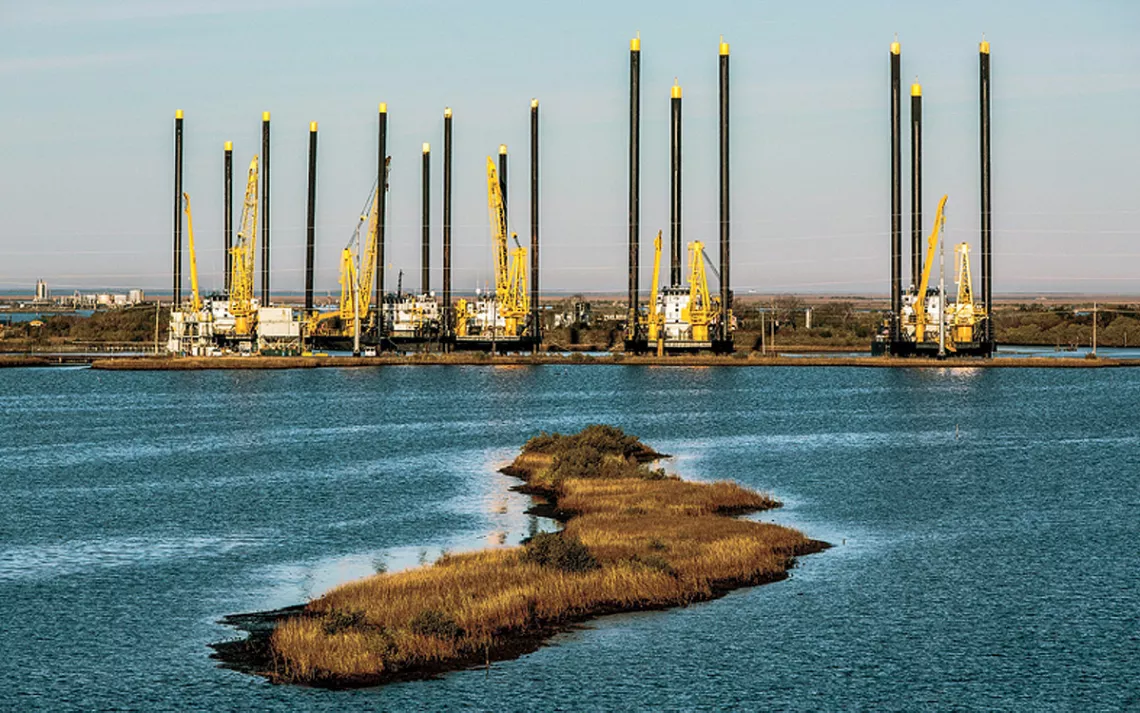
Some South Carolinians fear that their coast could turn into Port Fourchon, Louisiana, the biggest oil terminal in North America. | Photo by Will Widmer/The New York Times/Redux
Regardless of what the final plan looks like, multiple environmental groups will certainly file lawsuits. The Sierra Club and other organizations have already challenged the legality of Trump's initial executive order rescinding the Obama administration's plan. And the apparent arbitrariness of the Florida exemption promises to be a particular point of contention for both environmental groups and state governments. States could also seek to impede the plan by denying permits for onshore drilling infrastructure. Ultimately, with enough political pressure, Congress could intervene through the Congressional Review Act. Offshore drilling is likely to be a major issue in some districts during the 2018 midterm elections.
After our meeting with Hemingway, Howell and I drove out to the North Inlet-Winyah Bay National Estuarine Research Reserve, a gorgeous landscape of salt marshes, tidal channels, oyster reefs, and a tupelo forest towering from a swamp nearby. We toured the research lab, then crossed a wooden walkway to where the view opened on acres of protected salt marsh. It was cool and peaceful, the spartina and needlerush shifting in the breeze. Fiddler crab holes dotted the sandy soil. There were no other people, only an egret poking around.
About 90 percent of the commercially harvested marine species in South Carolina—crabs, shrimp, oysters—spend part of their lives in coastal estuaries like this one. I wondered how these nurseries would fare if the Atlantic were given to the oil companies for testing and drilling.
Howell talked about the ties between climate change and the fossil-fuel-driven drilling industry. Then her tone shifted. "When I walk on the beach these days, I don't just see people playing," she said, her voice catching. She sees what the destruction might look like, the summer memories that won't happen. We can't deprive future generations of a healthy coast simply because of bad decisions or indifference, Howell said.
She paused. "That's why I wanted you to see all of this."
This article appeared in the March/April 2018 edition with the headline "An Ocean of Dissent."
This article was funded by the Sierra Club's Our Wild America campaign (sc.org/ourwildamerica).
#NoThanks
After the Trump administration announced its plan to open up most U.S. coastlines to offshore oil and gas drilling, 15 governors from coastal states, one-third of them Republican, came out against the plan. When Interior Secretary Ryan Zinke promised to exempt Florida, political leaders from coast to coast took to Twitter to voice their outrage—and to demand similar treatment.
"If North Carolina is not exempted from the threats posed by offshore drilling, we will sue the federal government."
—Governor Roy Cooper, North Carolina
"When President Trump announced a plan to open our coastline to drill for oil, we, the people of RI, said, 'Not on our watch.'"
—Governor Gina Raimondo, Rhode Island
"Hey @secretaryzinke, how about doing the same for #Oregon?"
—Governor Kate Brown, Oregon
"The governors of coastal states are telling the Trump administration 'no' to offshore drilling."
—Governor Dan Malloy, Connecticut
"I continue to oppose efforts to open Maine's coast to drilling, which poses significant risk to marine and coastal resources, our economy, and our way of life. I oppose the Department of the Interior's draft plan."
—Senator Susan Collins, Maine
"New York doesn't want drilling off our coast either. Where do we sign up for a waiver, @secretaryzinke?"
—Governor Andrew Cuomo, New York
"I spoke by phone today with Interior Secretary Ryan Zinke and reiterated my opposition to his offshore oil drilling proposal. I told him the concerns of Washingtonians and West Coast residents deserve to be treated with the same consideration and deliberation as those in Florida."
—Governor Jay Inslee, Washington
"Don't touch California. If you want to drill, do it off Mar-a-Lago."
—Former California governor Arnold Schwarzenegger
—Wendy Becktold
 The Magazine of The Sierra Club
The Magazine of The Sierra Club
